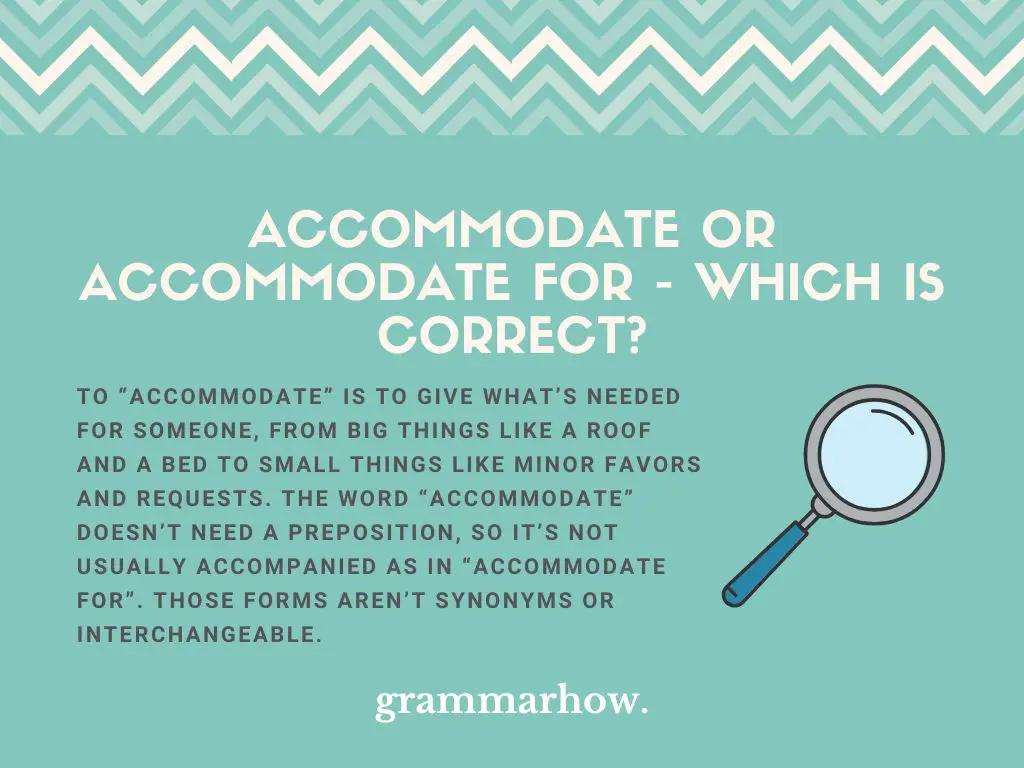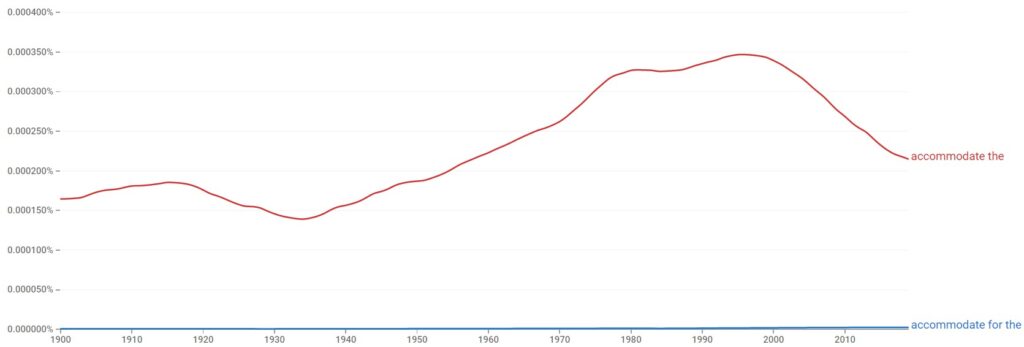When somebody asks you for a favor, how do you “Accommodate” that? Do you say you’ll “Accommodate”, or “Accommodate For”?
We want to know what’s the meaning of “Accommodate”, as well as the correct way to use it. We also want to know if there are any mistakes to avoid.
Accommodate or Accommodate For – Which Is Correct?
To “Accommodate” is to give what’s needed for someone, from big things like a roof and a bed to small things like minor favors and requests. The word “Accommodate” doesn’t need a preposition, so it’s not usually accompanied as in “Accommodate For”. Those forms aren’t synonyms or interchangeable.

Take a look at the examples below:
- The new apartments will be able to accommodate hundreds of new residents.
- The new apartments will be able to accommodate for hundreds of new residents. (incorrect)
Take a look at the examples above. One sentence uses “Accommodate”, while the other uses “Accommodate For”. As you can see, “Accommodate For” is unnecessary.
The sentence that says “accommodate hundreds of students” is grammatically correct as it is and needs no adjustments. In this case, not only “Accommodate For” is unnecessary, but it’s also incorrect and should be avoided.
Accommodate
The act of giving someone what they need or ask for is called “Accommodate”. This word doesn’t need to be preceded or followed by a preposition to make sense.
Let’s see how to use “accommodate” in a sentence:
- The school makes an effort to accommodate students of all backgrounds.
- The town was small, so its airport couldn’t accommodate many planes.
- Ramps were added to the design to accommodate wheel-chair users.
- Does the restaurant make accommodations for those with food sensitivities?
- The city was building new roads to accommodate the rising number of cars.
There are many ways to express the same idea as the word “Accommodate”. One can “make accommodations”, or “allow for accommodations”, or even – much more casually, simply do others a favor.
To “Accommodate” is considered a formal word, used in a polished setting that requires some level of formalities. Keep that in mind when choosing this word for your speech.
Accommodate For
The “Accommodate For” form, with the word and a preposition, is usually excessive and unnecessary. Even when it looks grammatically correct, the preposition “For” tends to make no real difference in the sentence in those instances.
We always recommend that you keep your speech concise and objective. Consequently, we suggest that you forego the “For” when talking about “Accommodating” someone or something.
Take a look at the example below:
- The company flaunted flexible schedules to accommodate for its employees’ availability. (incorrect)
- The company flaunted flexible schedules to accommodate its employees’ availability.
- The house was big enough to accommodate for a large family. (incorrect)
- The house was big enough to accommodate a large family.
- The convention center was not large enough to accommodate for large quantities of people to attend the event. (incorrect)
- The convention center was not large enough to allow for large quantities of people to attend the event.
Sentences 1 and 3 show “Accommodate For” in use, followed by sentences 2 and 4, which for how “Accommodate by itself works better in making the sentence flow and convey its message.
Sentence 5 also brings “Accommodate For”. However, it’s followed by a different correction. Instead of “Accommodate”, we used “Allow For” this time. “Allow For” is a grammatically correct and idiomatic alternative to “Accommodate For”.
Which Is Used the Most?
Which one of those forms is used more often, “Accommodate” or “Accommodate For”? Take a look at the graph from Google Ngram Viewer below.

As expected, “Accommodate”, without the preposition “For”, is the most used form. It has always been and there’s no indication whatsoever that it might change in the future.
There’s no doubt that “Accommodate” without any complement is the recommended form to use, and we are happy to see this is what people use the most.
Final Thoughts
To “Accommodate” is to give someone (or something) what they need or ask for. You can use this word, in any verb tense, when conveying this idea. “Accommodate” doesn’t need to be preceded or followed by a preposition. Consequently, “Accommodate For” is unnecessary and should be avoided.
